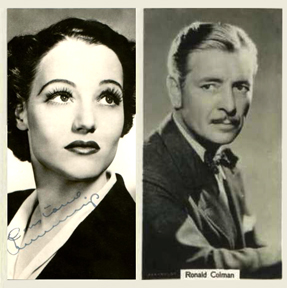Here are 10 things you should know about Warren Hymer, born 116 years ago today. After a brief stage career, Hymer appeared in more than 125 films over a 20-year movie career.
Tag: Harry Cohn
Happy 106th Birthday, Jean Harlow!
Jean Harlow, the original Blonde Bombshell, was born Harlean Harlow Carpenter 106 years ago today in Kansas City, Missouri. Here are 10 JH Did-You-Knows:
- Harlow, the daughter of a dentist and his wife, left home at 16 to marry Charles McGrew, a businessman seven years her senior. The pair moved to Los Angeles, where Harlow was soon garnering assignments as an extra in pictures.
- Her marriage to McGrew ended after just two years, allowing Harlow to focus on her career. She soon graduated from extra work to bit parts in features and shorts.
- Harlow’s big break came in 1930 when she was cast in Howard Hughes‘ World War I epic, Hell’s Angels. The picture’s premiere at Grauman’s Chinese Theatre in Hollywood was reported to have drawn a crowd of 50,000 people.
- Hughes sold Harlow’s contract to MGM, where her star continued to ascend. Her work in Frank Capra‘s Platinum Blonde (1931) was very well received, and the following year she was paired with Clark Gable in John Ford‘s Red Dust, the second of six pictures she and Gable would appear in together during her short career.
- Harlow is said to have turned down lead role in Freaks (1932) and King Kong (1933).
- Harlow served as godmother to Millicent Siegel, the daughter of gangster Benjamin “Bugsy” Siegel. She also dated mobster Abner “Longie” Zwillman, who advanced her career by loaning Harry Cohn, the head of Columbia Pictures, $500,000.
- In 1935, Harlow demanded more money from MGM, refusing to work until they assented, and while she was on strike, she wrote a novel, Today Is Tonight. It wasn’t published until 1965, early thirty years after her death.
- Both Harlow and Marilyn Monroe starred opposite Gable in their final pictures—Harlow in Saratoga (1937) and Monroe in The Misfits (1961). Monroe idolized Harlow and refused the chance to play her in a biopic because she felt the script was not respectful to Harlow.
- At the time of her death, Harlow was engaged to actor William Powell (and had been for two years). Had the pair married, Powell would have been Harlow’s fourth husband.
- Though rumors long persisted that her mother, a Christian Scientist, refused medical care for her daughter, or that Harlow died of alcohol abuse, sunstroke, poisoning due to her platinum hair dye or any of a number of other causes, Harlow’s passing, at the young age of 26, came as a result of kidney failure.
Happy birthday, Jean Harlow, wherever you may be!

Hollywood Undressed, Chapter Seven
The seventh chapter from Hollywood Undressed, a 1931 memoir attributed to the assistant of masseuse and health guru Sylvia Ulback, a.k.a. Sylvia of Hollywood (but actually ghost-written for Sylvia by newspaper reporter and screenwriter James Whittaker), reveals the truth behind Sam Goldwyn‘s misbegotten and short-lived pairing of Ronald Colman and Constance Cummings.
A GALLANT EPISODE
 HERBERT BRENNON [sic] fixed it up for the boss to handle Ronald Colman
HERBERT BRENNON [sic] fixed it up for the boss to handle Ronald ColmanColman was living down in the Malibu Beach colony. Malibu is about the most unprivate community in the world. In the first place, the matchboard shacks are built so close together that when your neighbor takes off his shoes you call, “Come in.” But the movie people are used to getting in each other’s hair, and like it, all except Greta Garbo, who tries to stick to her own toothbrush. So the lateral propinquity, as you might call it, is not a drawback in Malibu. But the longitudinal propinquity—the nearness to sea water on the one side and an eternal automobile procession of fandom on the other side—sometimes creates trouble. You’re always finding a snail or a tourist in your oatmeal.
About the time that Sylvia went down to Malibu to look up Colman, there had just been an epidemic of peeping Toms and Thomasinas plaguing the colony. Of course, the ladies were bothered most. Fans with big goggle eyes on stems were emerging from behind the wall paper at all sorts of embarrassing moments. Believe it or not, films girls who would act in a De Mille production without thinking anything of it can get just as nervous as an Iowa schoolma’am about a funny scratching noise at the bathroom window.
But if you think it was only the girls that were bothered by peepers, you don’t know fandom. Every morning there was just as much excitement about the size-five footprints outside the boys’ windows as about the size-nines outside the girls’. The colony was all excited that Sunday morning when Sylvia reported at Colman’s shack for duty.
The boss walked in without knocking and got held up by an alarmed Filipino.
“Go ‘way, please,” he squealed, and shook a towel at her.
“Where’s Mr. Colman?” asked Sylvia with authority.
“In bed, please,” protested the Filipino, and got in front of Ronald’s door, where he prepared to die. “Go ‘way, lady!” he kept squealing.
“In bed?” said Sylvia imperturbably. “Good. That’s just where I want him. Let me by.”
“No ladies allowed,” quavered the Filipino, who was really frightened. “Be quiet! I call police!” And he got a desperate hold on the door knob of Ronald’s door and began to bleat.
His cries were answered by two men who popped out of guest-room doors. Sylvia recognized them as William Powell and Philip Strange, two cronies of Ronald’s. But they didn’t know her at all. Strange took charge of the situation in a calm, haughty British way.
and Philip Strange, two cronies of Ronald’s. But they didn’t know her at all. Strange took charge of the situation in a calm, haughty British way.
“Come now, my good woman,” he remonstrated. “Tell us what you want.”
Sylvia got wise to what was eating them and amused herself by feeding their panic.
“I just want to rub Ronald Colman,” she begged, trying to put a strange glitter in her eyes. “Just let me rub him once!”
“Oh, now, tut, tut!” soothed Strange.
The Filipino began again: “Go ‘way, lady, go ‘way!”
And Colman put a sleepy head out at the door to inquire what was wrong.
“This woman wants to rub you,” Strange explained.
“Well, why not?” yawned Colman. “She’s my masseuse.”
Strutting into Ronald’s chamber, Sylvia stole a backward glance at the nonplussed trio in the living room. She got a distinct impression that Philip Strange ball well didn’t approve of such goings-on.
The boss still counted Colman among her steady clients when she got mixed up in the series of errors that turned out to be comedy but might have been tragedy, and that established Constance Cummings , the Broadway ingénue, as a newcomer in films.
, the Broadway ingénue, as a newcomer in films.
